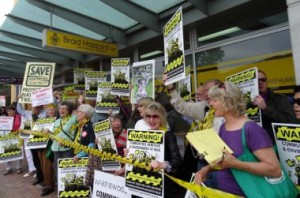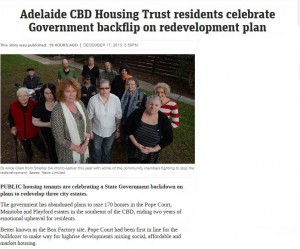I’m celebrating: 2013 was a great year for community activism in planning.
In New South Wales, concerted action by many forces, including the Better Planning Network (https://betterplanningnetwork.good.do/nsw/fund-the-better-planning-network-in-2014/), resulted in the State Government withdrawing the contentious and flawed proposed state planning legislation.
The Better Planning Network has more than 430 community groups and many more affiliated individuals (like me), and this number is growing every day.
On 28 November 2013, the NSW Minister for Planning and Infrastructure, the Hon. Brad Hazzard, announced that he would withdraw the NSW Planning Bills until February/March 2014. The Minister made this announcement because of heavy amendments made to these Bills in the Upper House by the Labor, Greens and Shooters and Fishers parties.
Aside from some misguided planners and the developers’ lobby, nobody had anything good to say about the community engagement components of the Bills, which were my main concern.
I argued on a number of occasions that it was unrealistic – strategically and psychologically – to expect residents to be happy with community engagement limited to the strategic planning stage. Many people, including prominent lawyers, judges and local government, agreed.
We are all praying that the State Government will avoid the old trick and not undertake the next stage of consultation during January (as often people do!). It’s too late to put the plans on display on Boxing Day in a distant galaxy – but stranger things have happened to hitchhikers in New South Wales!
It was a big win, nonetheless.
Dear Manitoba
On a smaller scale but equally as important, we had a major win in South Australia, What architect Ian Hannaford called his “Dear Manitoba” has been saved from demolition or redevelopment, as have two other inner city site with public housing tenants.
I cried when I heard the news from a Manitoba resident.
- A Big Win for Activism!
I love Dear Manitoba; as a Member of the SA Housing Trust Board, I was involved in its planning and design in the early 1970s and even lived there briefly in the early 1980s. This year Manitoba will celebrate its fiftieth birthday.
All credit to Alice Clark and Shelter SA and the indefatigable residents of Manitoba and the other two sites.
And a compliment to Social Housing Minster, Tony Piccolo, who finally saw the light.
Brickbats to Renewal SA.
Brickbats to Renewal SA. Do you know that two years ago they hand-delivered their original letters to Manitoba residents on Christmas Eve?
Can you believe that?
The letters were very vague and contained nothing that could give anyone confidence; they created terror and anxiety at a time of year widely known to be difficult for vulnerable people (for all of us, actually)…
I find it hard to imagine that the Board of Renewal SA approved those sorts of heavy-handed and insensitive tactics.
There are experienced people on that Board who certainly should know better:
https://www.renewalsa.sa.gov.au/Latestnews/tabid/102/EntryId/17/URBAN-RENEWAL-AUTHORITY-BOARD-ANNOUNCED.aspx
I can’t imagine the experienced Renewal SA officers I know doing such a terrible thing.
How did this happen? Who approved it?
And, more importantly, how can we make sure that
vulnerable public tenants are not treated in such a manner again?
Let’s hope the corporate memory of Renewal SA survives into any new incarnation.
The message is clear: Do not do such cruel things! Just do not do them!
A delicate balancing act
So, it’s been a good year for activism.
And a challenging one.
At this very moment, with my only sibling, I’m co-designing a memorial for my mother who died in her hundredth year. She was a shocker, severely mentally ill.
So you can imagine that it’s a delicate balancing act – emotionally and practically – to create such an event – for the two daughters and our friends and families.
Similarly (a comparison in sharp relief during this highly charged week), it’s a delicate balancing act being a planner and an activist.
Punishments are routinely doled out.
Doors quietly close and invitations are summarily withdrawn. People sidle away at cocktail parties, eyes fixed on their shoes.
Activists know the price we pay for speaking out when others cannot – or will not.
For activism is more than rubbing raw the sores of discontent, as the American activist Saul Alinksy would have it.
For planners with a conscience, activism is keeping the voices of marginalised people alive in public forums and debates about planning.
In tough economic times, I find (sadly) that some of my most respected planning colleagues simply ignore emails that ask them to speak out about ethical matters. They seem to have hardened their hearts against the plight of disadvantaged people. Or, at least, they’ve silenced their inner voice.
But, like finishing off the tiramisu at Christmas dinner, somebody has to do it.
And this year it was me. On both fronts.
I’m proud to have helped the courageous people (you know who you are), who really, truly, put themselves on the line for justice in planning and housing.
Here’s to 2014
Here’s to a 2014 with more planning and housing wins for vulnerable people in Australia.
And here’s to a 2014 with more respect for those planners who choose to support them in ways that push the envelope for our more conservative colleagues.




Planning is about creating healthy, sociable and resilient communities, encouraging employment and productivity in a way that empowers people to ‘have a go’ at being engaged, to live and to survive. It is also about respect and tolerance. Some things such as the fundamental principles of caring for cultural and natural assets (such as the Great Barrier reef, the Adelaide Park Lands, public space used for public purposes, regional economies) must be defended by political and planning systems. When they are not the system becomes dysfunctional and harmful to the population. We need planners prepared to advise and defend fearlessly, rather than kow tow to misguided political masters and developers blinded by the growth is good syndrome. As one person put it : ‘Growth for growth’s sake is a cancer cell.’ So Wendy, if people look at their shoes rather than engage with this discussion they lose! And ambitious planners compromise themselves every day by not tackling it more creatively.
Liked your blog – roll on 2014.